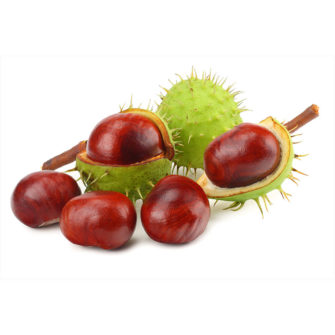The horse chestnut tree, not to be confused with the American chestnut tree, is native to the Balkan Peninsula. The extract from the horse chestnut seed is a popular dietary supplement commonly used to improve vein health and reduce inflammation. The primary active component in horse chestnut extract is aescin, which has many health benefits.
Chronic Venous Insufficiency (CVI) is the most common use for horse chestnut extract. This health condition characterized by poor blood flow in the veins of the legs. It is worth noting that another commonly used herb for CVI, Butcher’s Broom, is worth looking into.
Symptoms of CVI include:
- edema, or swelling of the legs
- leg pain or cramps
- itchy legs
- varicose veins, or enlarged, twisted veins in the legs
- leg ulcers
- weakness in the legs
The compound aescin in horse chestnut has multiple medicinal properties that can help with treating CVI. For example, it may increase blood flow in your veins, possibly improving symptoms. Aescin helps to improve venous tone by improving blood flow in your legs and can help decrease leg swelling and pain associated with varicose veins.
The extract is also commonly used to relieve hemorrhoids. The anti-inflammatory properties may help relieve symptoms of hemorrhoids by reducing inflammation and swelling in the swollen veins around your anus and rectum.
The extract also contains powerful antioxidants which can help prevent cell damage caused by unstable molecules called free radicals. Too many free radicals can lead to inflammation and cellular damage that could lead to cancer.
Horse Chestnut Uses
- Chronic Venous Insufficiency (CVI)
- Reducing inflammation
- Antioxidant
Side Effects of Horse Chestnut
Beware of unprocessed horse chestnut seeds contain a compound called aesculin. Ingesting aesculin is considered unsafe by the Food and Drug Administration (FDA) and can result in poisoning. Signs of poisoning include depression, muscle twitching, paralysis, coma, and even death. Avoid ingesting unprocessed horse chestnut seeds.
Less serious side effects:
- Digestion issues
- Upset stomach
- Dizziness
- Headache
Also, allergic reactions have been reported when horse chestnut extract was applied to the skin.
Contraindications Related to Horse Chestnut
- May slow blood clotting and increase the effects of blood thinners like Coumadin.
- May lower blood sugar and cause levels to become too low if taken with diabetes medication.
- May reduce the absorption of Nonsteroidal anti-inflammatory drugs (NSAIDs), used to treat inflammation.
- May have a diuretic effect, which could delay how fast your body processes lithium, a medication used to treat psychiatric disorders.
Origins of Horse Chestnut
Balkan Peninsula
My Favorites
- No Favorites Yet

